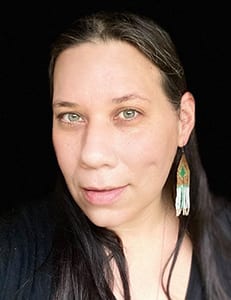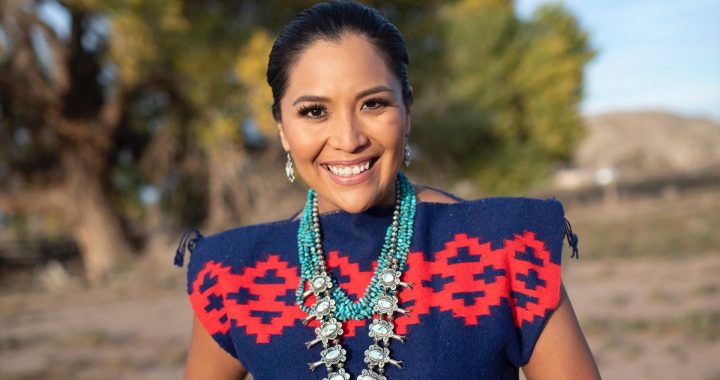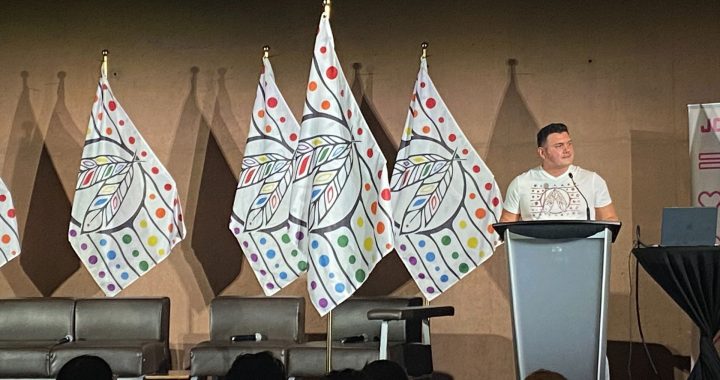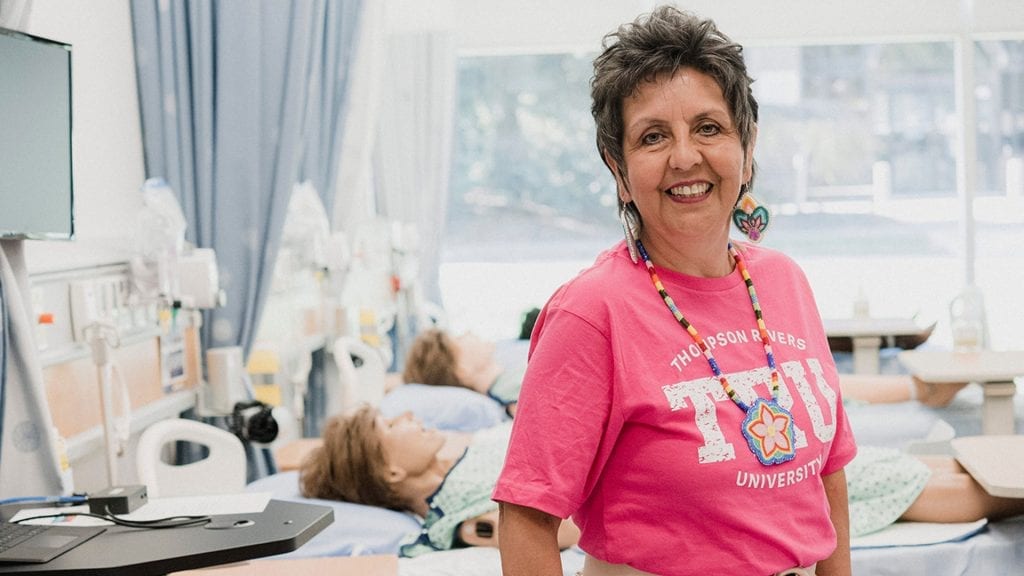
Lisa Bourque-Bearskin, Nehiyaw iskwêw (Cree woman) from Beaver Lake Cree Nation. Photo by Billie Jean Gabriel Photography.
On Indigenous Nurses Day, Indigenous nurses are recognized for “answering the call to justice” in their leadership transforming and navigating colonial healthcare systems.
Indigenous Nurses Day in B.C. falls on May 10, and organizers say it specifically acknowledges the contributions of Indigenous nurses who have fought for justice and cultural safety in the healthcare system.
“To all those who continue to work so close with the people, our hands are held high in your honour this week and every other day of the year,” says Lisa Bourque-Bearskin, an Indigenous research chair of the Canadian Institutes of Health Research (CIHR).
Bourque-Bearskin, a Nehiyaw iskwêw (Cree woman) from Beaver Lake Cree Nation is also an associate professor with the Thompson River University’s School of Nursing. Her teaching career came after working 25 years as a registered nurse, she says.
“Uplifting and inspiring nurses for change, we must speak up and out against social injustice,” she says.
Indigenous Nurses Day takes place during a wider celebration for National Nurses Week which has the slogan this year of “We Answer the Call,” developed by the Canadian Nurses Association as a way to highlight the courage and commitment that nurses have in their work.
This theme has been expanded to “answering the call to justice” by the Indigenous Health Nursing Research (IHNR) team based at Thompson Rivers University, led by Bourque-Bearskin.
“Nurses should advocate for change based on the United Declaration on the Rights of Indigenous Peoples,” she says.
“To the Indigenous nurses who have always held a distinct and prominent role within Indigenous societies, both as life-givers and through traditional knowledges, medicines and healing practices — your work is undeniably the touchstones of caring practices during the COVID and opioid crisis we are facing today.”
The Racist Lady with the Lamp
National Nurses Week is pinned to the birthday of Florence Nightingale, long held as an icon of nursing and Victorian culture.
She was a product of the Victorian colonial mindset, and believed it was necessary to impose British culture.
But Bourque-Bearskin says “dismantling the image of colonial angels in nursing is a serious call for social action.”
The story behind Nightingale is explored by Natalie Stake-Doucet in Beyond Nightingale: The Racist Lady with the Lamp.
Stake-Doucet is a registered nurse and activist who studies the socio-political structure of hospitals in relation to nurses and nursing work.
The pedestal of Nightingale “tells a story of racism and exclusion within nursing,” writes Stake-Doucet.
“She was a staunch supporter of British colonialism, even with the knowledge of the death and destruction left in its wake. She believed Indigenous lives were a small price to pay for the expansion of the British Empire. Although some of her contemporaries recognized the brutality of the colonial system, Nightingale believed imposing British culture to be necessary.
“We cannot claim to teach nursing advocacy and leadership when our model for these concepts was a Victorian bigot,” she continues.
Stake-Doucet says the goal of writing the article wasn’t to “erase Nightingale from our history books” but that people recognize who she truly was and what her legacy means for nursing today.
“We lose nothing by relegating Nightingale to her rightful place in history. We gain critical insight, growth, and a richer understanding of what nursing is.”
Answering the call to social justice begins with critical nursing discourse, says Bourque-Bearskin.
She calls for an Indigenous lens to bring innovation and perspectives rooted in traditional knowledge, culture and land.
CIHR’s research program recognizes the full range of nurses: from teachers, to those practicing, to “grandmother nurses” who advise and hearten others.
The program also recognizes nursing students, already inspiring their peers with their dedication.
This research program is grounded in Bourque-Bearskin’s own Nehiyaw teachings of mâmawoh kamâtowin, which means “coming together to help each other,” she says.
Bourque-Bearskin sees this week as an opportunity to highlight the special role Indigenous nurses hold, in their communities and in society at large.
“Indigenous nurses give that authentic life-giving force to truth telling while reconciling the ascriptions that have been historically embedded into the flesh of Indigenous Peoples,” she says.
From risks to rights
On Nov. 26, 2020, an independent investigation found that Indigenous-specific racism, stereotyping and discrimination in B.C.’s healthcare system is widespread.
Mary Ellen Turpel-Lafond’s report In Plain Sight included testimonies of over 9,000 people, including patients, witnesses and healthcare workers.
The report revealed that 59 per cent of Indigenous healthcare workers surveyed had experienced colleagues saying discriminatory or hurtful comments in front of them. It also showcased how experiencing or witnessing racial prejudice at work severely impacted them.
With the release of the report, Turpel-Lafonde issued 24 recommendations to address the problem.
“Radical reconciliation from risks to rights, without having to say we’re sorry, is the cornerstone of nurses caring activism and leadership to support health systems transformation,” says Bourque-Bearskin.
She seeks to educate and empower nurses through the difficulty of witnessing the unsafe care and poor access to health care services for many Indigenous Peoples “stemming from systemic racism, marginalization, biased informed care and discriminatory treatment calls us to action.”
That impetus inspires Bourque-Bearskin and Indigenous nurses to seek alternate possibilities to better health care.
Currently she is working with communities and her peers in health care to enhance Indigenous nursing knowledge and social determinants of health.
Her focus is on Indigenous wellness that “maintains the cultural integrity of nurse practice and supports Indigenous clients’ sovereignty.”
‘The momentum must be kept’
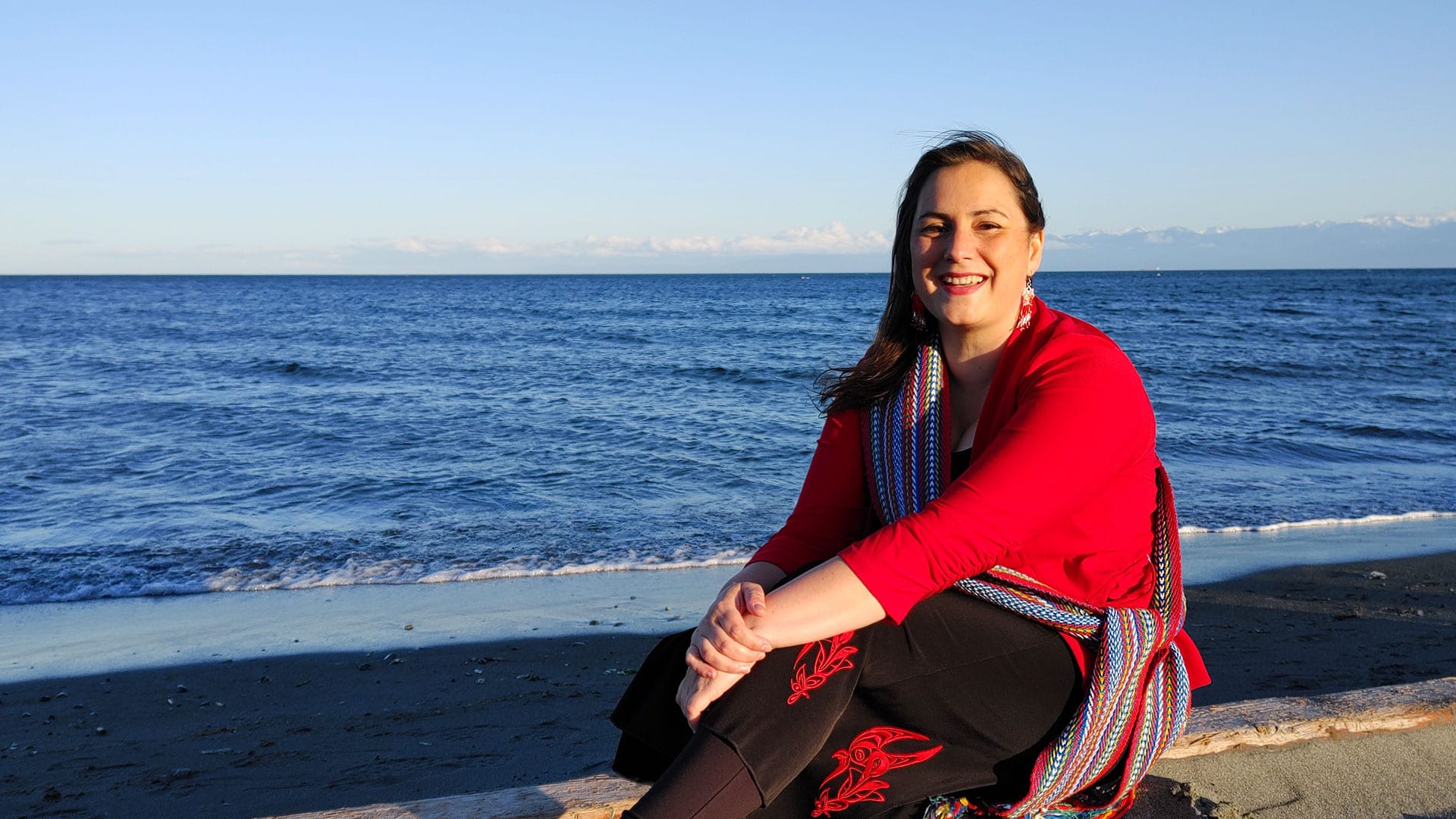
Another part of the Indigenous Health Nursing Research (IHNR) team is Christina Chakanyuka, a Métis woman who grew up on Dene/Cree territory.
She is a full-time PhD student in nursing and an assistant professor at the University of Victoria.
Chakanyuka says all the information that was revealed in the In Plain Sight report has been happening for generations.
“Indigenous nurses know this is not new,” she says. “It is an opportunity, especially for non-Indigenous healthcare providers, to listen, reflect, step up and speak up about racism and learn new anti-racism skills that begin with critical self-location and are followed by ‘it starts with me’ thinking.
“Truth needs to come before reconciliation can happen, and anti-racism work before cultural safety.”
It’s a common theme in her work with other Indigenous nurses, and BIPOC nurses in general. It’s important to understand what needs to happen, and in what steps, she says.
“Some people get a little too excited about the term decolonization without really considering what it is,” she says.
“Indigenous nurses deserve safe spaces to come together. … We need to recognize that generations of Indigenous nurses in Canada have been brave.”
The first registered Indigenous nurse in Canada was Charlotte Edith Anderson Monture, who had to go to the U.S. to be trained because of racist colonial policies that denied her applications, and would have revoked status if she attended post-secondary school.
Chakanyuka says anti-racism work requires learning about the truth of our shared colonial histories and committing to every day acts of reconciliation.
“For the future, Indigenous and non-Indigenous people require courageous spaces to come together — it’s already happening, it has been happening — and the momentum must be kept,” says Chakanyuka.
“Non-Indigenous nurses must be brave, and choose to engage in authentic self-location and anti-racism.”
Chakanyuka quotes the chairman of the Truth and Reconciliation Commission of Canada, former senator Murray Sinclair, saying “The road we travel is equal in importance to the destination we seek. There are no shortcuts when it comes to the Truth and Reconciliation. We are forced to go the distance.”
Chakanyuka says “it starts with me. We must all go the distance. It is a unique tension to be an Indigenous person, and a nurse working in a system founded on colonial approaches.
“The opportunity for Indigenous nurses and allies to come together to collaborate towards solutions is an essential shift.”
This series of stories will profile Indigenous nurses across generations and celebrate the many intersections of diversity that they bring to the healthcare system.




